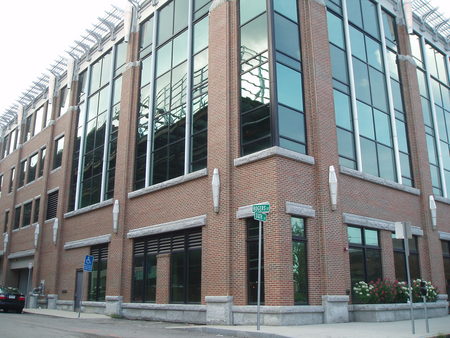New England Cities All Over the Map on Police Management…
This post is the second in a series on the debate over Management of the Police Department in Springfield.

Springfield Police Patch (via Twitter/@spd_hq)
Since the debate to reform Police leadership has begun in Springfield, Mayor Domenic Sarno has employed a number of legal and rhetorical arguments to halt the growing tide of support for change. Among them is the suggestion that police departments are moving toward putting authority in the hands of a single individual. City Solicitor Ed Pikula, in particular, has made this argument in both his legal opinion to the City Council and in public remarks before the body.
But that has not deterred supporters of a revived Police Commission. During a City Council Committee hearing, Julian Tynes, a former Chair of the Massachusetts Commission Against Discrimination, said no such pattern exists.
Tynes may be right. A review of New England cities Springfield’s size, as well as Albany and Boston, suggests there is no particular direction or even majority as to Police management and oversight. Among these cities police leadership and review vary wildly within the confines of state law.
Commissioner Bill Fitchet (via urbancompass.net)
Today, organization, discipline, and management of the Springfield Police Department rests in the hands of a sole commissioner. A review board instituted under executive order makes recommendations as to police discipline. For what it is worth, Pikula has recommended that the Council codify the mayor’s order. An attempt to do that in 2011 failed on a 6-7 vote of the Springfield City Council.
Ordinances before the City Council would revive the Commission who would hold most of those powers while day-to-day operation would be in the hands of chief employed under state civil service laws. Sarno vehemently opposes reinstitution of a Commission, arguing the status quo removes the politics from the Police Department. Community groups and several councilors, but not yet enough to override a veto, support the Commission’s return. Some groups are leery of a return of a commission, but are not thrilled with the status quo either.
The fast-paced and confrontational debate has been driven in part by Sarno’s announcement that he would select one of the city’s three deputy chiefs to succeed Fitchet. Deputiy Chief John Barbieri, William Cochrane and Robert McFarlin are slated to meet privately with Sarno and other top staff starting this week. The mayor’s office told The Republican the process would remain confidential at this point for security and personnel reasons.
An increasing count of sources have claimed, albeit off the record, that McFarlin has the inside track for the job.

The Springfield Control Board abolished the Control Board and installed a single Commissioner to lead the Department (via urbancompass.net/Heather Brandon)
Whatever the fate of Council’s proposed ordinance or Sarno’s decision, any Police management structure in Springfield may imitate other New England cities to some degree. No police departments are fully divorced from political interference or considerations. While it is true that the old Police Commission was riddled with politics, the sole Commissioner setup in Springfield is no less vulnerable to politics. Suggestions to the contrary are either woefully naïve or deeply cynical.
All of the cities reviewed by WMassP&I approach police management and review in different ways. Some have a system like Springfield’s. Others are similar but with a codified review board. Some have setups like the old Springfield Police Commission and some have something unique.

New Haven’s Police Management match Springfield most closely (via wikipedia)
New Haven comes the closest to Springfield’s status quo. New Haven’s Police Chief, working with an advisory board, metes out police discipline and runs the department. Like Springfield, that board only exists under an executive order issued by former Mayor John DeStefano. A Board of Police Commissioners helps the chief write department regulations, but their role seems purely advisory.
The cities of Albany, Hartford and Providence also grant the chief the sole power of discipline, but both cities also have citizen review boards codified under ordinance. In other words, the review boards in these cities have a legislative mandate and cannot be swept away unilaterally by a new mayor.
(via providenceri.com)
In Providence, the City Council appoints most of its review board, called the External Review Authority. Providence’s ordinance has language providing for an executive director. Albany’s system is very similar. The New York capital’s Common Council appoints a majority of the 9 review board members and the mayor appoints the remainder. Hartford’s review board consists solely of mayoral appointments, but for one by the human rights commission. While the Hartford review board has no employees of its own, the enacting ordinance calls for existing city staff to staff the board.

Hartford, Conn. (via wikipedia)
Out of state examples provide only so much guidance as Connecticut and Rhode Island municipal law is quite different from Massachusetts. Absent a home rule petition initiated by residents or one approved by both the mayor and council, Springfield’s charter generally prohibits appointments by anyone other than the mayor or even mayoral appointments subject to Council confirmation. In other words, codifying Springfield’s existing system would not mirror cities that on the surface have setups similar to what Pikula has proposed.
Springfield is ahead of sister cities Lowell and Worcester, which have almost no outside oversight the police department. Units within the departments respond to complaints and report to the Chief (in Worcester) or Superintendent (in Lowell), who has the final word on discipline. In both cities, a city manager hired by the city makes virtually all appointments including the police chief/superintendent. Theoretically, city managers reduce politics, but also limit the public’s influence on the executive branch.

Worcester Police Badge (via Fracebook/WPD)
Indeed, Worcester’s entirely internal process became the genesis of one of the commonwealth’s key Public Records cases (internal affairs cases are not necessarily exempt from disclosure as a personnel record). Worcester has had a few high-profile cases of police misconduct, but it is difficult to use that as an objective measure alone as to whether or not the system is working.
Sources in Lowell say that the current makeup of that city’s review process has not caused any problems. Requesting anonymity because they did not have authority to speak on the record, a source in Lowell said, “There is an internal complaint process within LPD. They thoroughly investigate.” Although issues do arise, civil rights groups have not raised any alarms about anything of late, the source said.
Empowering a review board with disciplinary power appears to be the brass ring for many Springfield reform supporters. Doing so prior to Fitchet’s retirement would present a conflict in his contract, one a court would likely consider a breach on the city’s part. Part of what has alarmed commission advocates is Sarno’s apparent plans to name a new commissioner as soon as this month, well before Fitchet retires in June. If the next commissioner’s contract includes full disciplinary power, the Council (or even a future Council and Mayor) could not reassign those powers until until the contract expires.

Bridgeport Police Patch (via bridgeport.gov)
Commissions with teeth and additional advisory powers exist in New England. Bridgeport and Stamford retain a police commissions that organize and discipline their departments in concert with the chief. In both Connecticut cities, the Commission is the final word on discipline and internal complaints. Boston has a community ombudsman panel that responds to external complaints and appeals from within the Police Department. The ombudsman board is appointed by the mayor.
Boston is also notable because of frequent comparisons to Springfield and, unlike the state’s other largest cities, it has a strong-mayor government. In the Hub, there is both a Commissioner, currently Bill Evans, and a Superintendent-in-Chief, William Gross.

Boston Police Commissioner Bill Evans (via bpdnews.com
Evans holds an executive position over the sprawling department that oversees many administrative functions common to a large institution, but not related to policing directly. The department’s legal counsel, labor relations office and its professional standards division among others report directly to Evans, a civilian employee. Gross is the city’s top sworn officer and has operational control of actual policing units including a host of bureaus, offices and divisions.
In Boston, a civilian, responsible only to the mayor, is above the top sworn officer. Fitchet, by contrast, per his contract and un-contradicted by the present commissioner ordinance, remains a sworn Springfield Police Officer.
If anything, the Boston structure is not unlike what Springfield used to have, albeit with the Commission, being a part-time gig, acting more deliberatively. Operational control lay with the chief, while policy, planning and regulation was the Commission’s responsibility.

Cambridge Police HQ (via cambridgema.gov)
Setting aside the fact that its chief executive is not elected, Cambridge may have a system able to meet the goal of reduced political interference, which Sarno has attributed to Springfield’s status quo. The police structure of the home of Harvard and MIT offers its chief a great deal of flexibility. In 1984, the city created a civilian review board that handles police discipline, but also advises the chief on other departmental matters. The chief otherwise controls the Cambridge Police Department.
For such a system to be palatable to Springfield’s broad community-union pro-Commission coalition, however, a Cambridge-like system would also need to address internal complaints as well the external ones. In Cambridge internal complaints appear wholly within the chief’s discretion.
Like Lowell and Worcester, Cambridge has a city manager hired by the City Council. As in those cities and a strong-mayor city such as Springfield, the Cambridge manager has near-absolute discretion to select and dismiss appointees, including the police review board.
Cambridge, like Providence, however, provides staff to its review board. That may not be financially feasible in Springfield, which has half the per capita income of Cambridge. Currently, only Solicitor Pikula and Sarno Chief of Staff Denise Jordan provide any paid staff work to the review board.
There are few trends locally, too. Springfield’s smaller neighbors, with likewise smaller departments but dissimilar demographics, have myriad approaches to police oversight and management among them.
In the end, the issue may not be how Springfield organizes police management. Some have demanded a national search for a commissioner to keep one individual or another out of the post. Mandating a national search by legislative fiat may be difficult and none of the cities surveyed appear to have such requirements in their ordinances or charters.
Securing the nine votes needed to override Sarno’s near-certain veto may be a steep climb. There is no shortage of models to consider beyond a revived Commission, but proponents’ fervor may not be enough. Indeed, absent those nine votes, something else may have to give before the city turns away from the status quo.